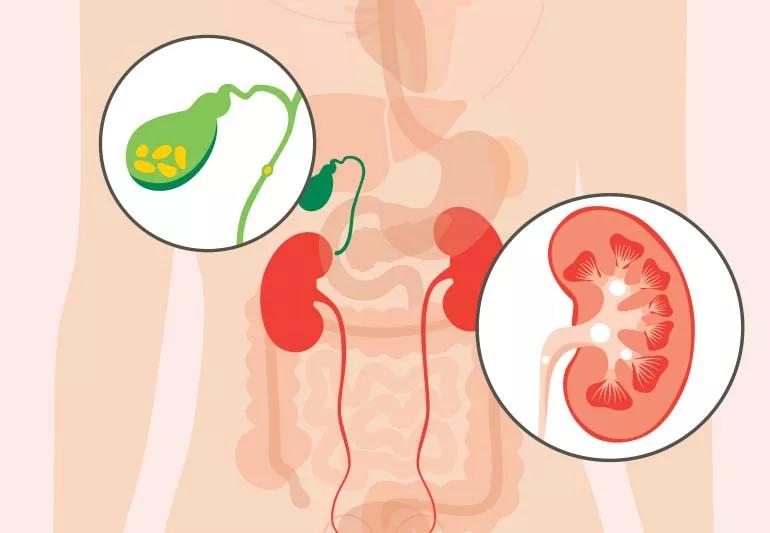Exactly how to Separate Between Kidney Stones vs UTI: Secret Aspects and Diagnostic Tips
Exactly how to Separate Between Kidney Stones vs UTI: Secret Aspects and Diagnostic Tips
Blog Article
Exploring the Manifestations and Causes of Kidney Stones in Contrast to Urinary System System Infections: A Detailed Guide
The expedition of kidney rocks and urinary system infections (UTIs) discloses a complicated interplay of symptoms and underlying reasons that call for cautious examination. What are the vital distinctions in their symptoms, and just how might these educate therapy techniques?
Overview of Kidney Stones
Kidney stones, also recognized as renal calculi, type when certain compounds in the urine crystallize and aggregate, causing the growth of tough deposits within the kidneys. These stones can vary in dimension, varying from a grain of sand to a golf round, and can be composed of various products, the most typical being calcium oxalate, uric acid, struvite, and cystine. The development of kidney stones is affected by several variables, consisting of dietary behaviors, fluid consumption, and genetic tendency.
Symptoms of kidney stones might include serious discomfort in the back or side, blood in the urine, queasiness, and constant urination, especially as the rock moves with the urinary system tract. Diagnosis typically includes imaging researches such as ultrasound or CT scans, alongside urinalysis to determine the rock's make-up.
Treatment choices differ based upon the size and sort of stone, along with the severity of symptoms (Kidney Stones vs UTI). Little rocks might pass normally with increased fluid intake, while bigger rocks might call for clinical interventions such as lithotripsy or surgical removal. Comprehending the pathophysiology and danger variables related to kidney stones is vital for efficient avoidance and monitoring
Review of Urinary System Infections
Urinary system tract infections (UTIs) are common microbial infections that impact any type of part of the urinary system, consisting of the kidneys, ureters, bladder, and urethra. They mainly occur when microorganisms, usually from the intestinal tract, get in the urinary system, leading to inflammation and infection.
The prevalence of UTIs is especially higher in females than guys, mainly as a result of anatomical differences, such as a much shorter urethra. Risk variables include sex-related activity, particular contraceptive methods, urinary system retention, and dehydration. The medical diagnosis of UTIs is usually verified with pee tests, which might reveal the visibility of bacteria, leukocyte, or red blood cells.

Symptoms of Kidney Stones
The discomfort related to kidney rocks can show up in numerous ways, frequently leading individuals to seek medical interest. Among one of the most typical signs and symptoms is extreme discomfort, typically localized in the lower back or side, which might emit to the abdominal area or groin. This discomfort, usually referred to as sharp or cramping, can occur suddenly and may fluctuate in intensity.
In addition, people might experience hematuria, or blood in the pee, which can range from microscopic total up to visible discoloration. This symptom might be come with by adjustments in urinary system behaviors, such as raised regularity or necessity, in addition to discomfort during urination. Nausea or vomiting and throwing up are likewise common, frequently resulting from the body's response to extreme pain.
Sometimes, people might experience high temperature and chills, especially if a second infection establishes as a result of the obstruction brought on by the rocks. In general, the mix of severe pain, hematuria, transformed urinary patterns, and intestinal signs and symptoms can provide considerable understanding right into the presence of kidney stones, necessitating prompt medical examination and treatment. Understanding these signs is vital for prompt diagnosis and effective administration of the problem.
Signs And Symptoms of Urinary System Tract Infections
Infections within the urinary tract typically provide an array of distinct symptoms that can considerably affect day-to-day live. One of the most typical signs and symptoms consist of a relentless impulse to pee, often accompanied by a burning sensation during peeing, known as dysuria. People might additionally experience raised regularity of peeing, generating percentages of pee each time.
Other noteworthy signs include foul-smelling or cloudy pee, which might show the existence of germs or pus. In some situations, urine might show up red or pink due to the presence of blood, a problem referred to as hematuria. In addition, people might experience pelvic discomfort or pressure, which can even more exacerbate the feeling of necessity.
Systemic signs may also manifest, such as high temperature, chills, and fatigue, specifically if the infection has ascended to the kidneys. It is vital to identify these signs early, as look at here neglected urinary system system infections can lead to extra serious complications. Kidney Stones vs UTI. Motivate medical focus is suggested when these signs are observed, allowing for ideal diagnostic analysis and treatment to alleviate discomfort and prevent additional wellness problems
Root Causes Of Each Condition
Regularly, kidney stones and urinary system system infections occur from distinctive yet in some cases overlapping reasons that can affect individuals in different more info here ways. Kidney stones normally form because of metabolic variables, dietary options, and hereditary predispositions. Enhanced degrees of calcium, oxalate, or uric acid in the pee can lead to stone development. Dehydration, not enough fluid intake, and high-sodium diet plans can aggravate these conditions, promoting condensation within the urinary system system.

Understanding these unique causes is vital for prevention and therapy. Kidney Stones vs UTI. While lifestyle alterations may minimize the danger of kidney rocks, suitable health and prompt therapy of urinary system tract infections are crucial for decreasing their reappearance and connected difficulties
Conclusion
In recap, kidney rocks and urinary system system infections existing distinct symptoms and underlying causes. Kidney stones are characterized by severe pain and metabolic factors, while urinary tract infections primarily involve microbial infections leading to urinary system necessity and pain.
The expedition of kidney rocks and urinary tract infections (UTIs) reveals a complex interplay of signs and symptoms and underlying reasons that necessitate mindful exam.Urinary system tract infections find out this here (UTIs) are common microbial infections that influence any kind of part of the urinary system, including the kidneys, ureters, bladder, and urethra.Frequently, kidney rocks and urinary system tract infections occur from distinct yet sometimes overlapping reasons that can impact individuals differently.In recap, kidney rocks and urinary system infections existing unique symptoms and underlying reasons. Kidney stones are characterized by extreme discomfort and metabolic elements, while urinary system system infections mainly entail microbial infections leading to urinary necessity and discomfort.
Report this page